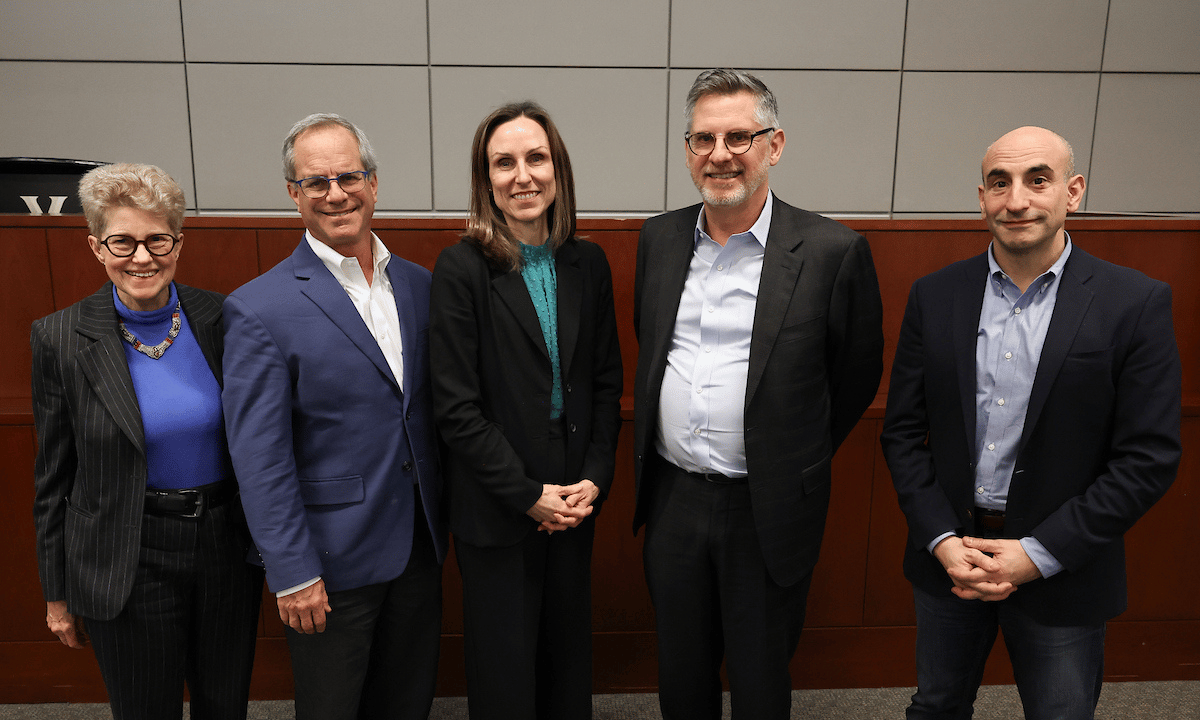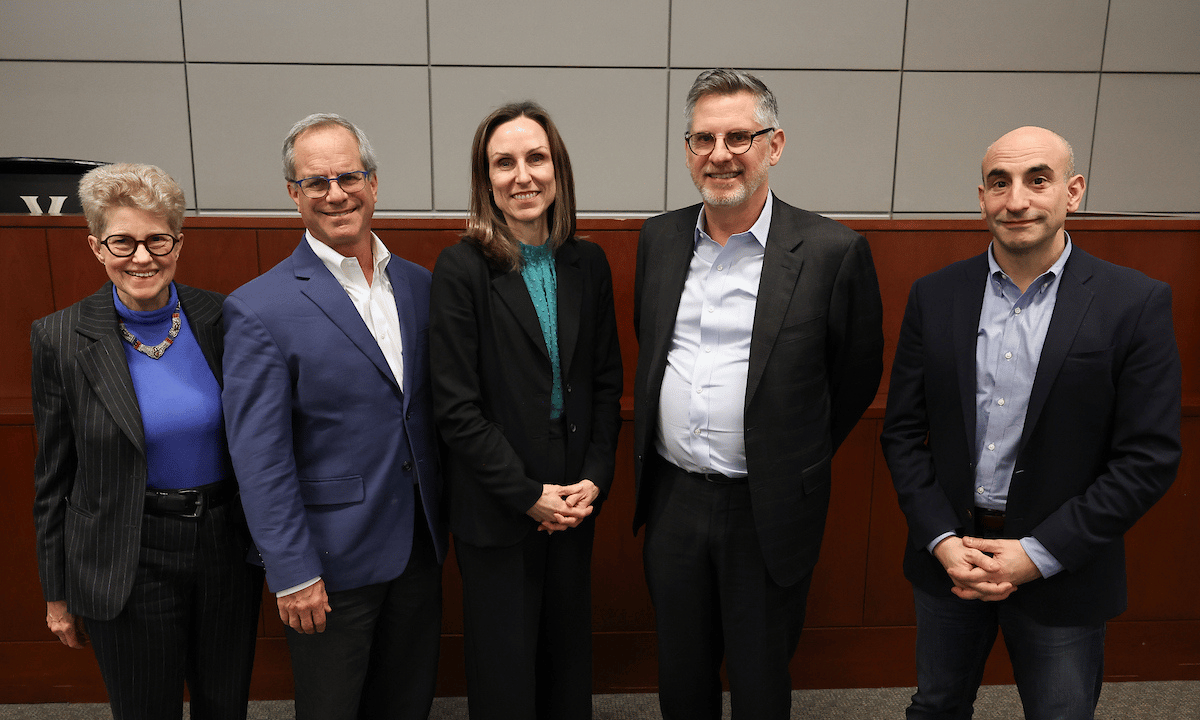Vanderbilt JETLaw Symposium Explores Legal Frontiers in Healthcare Technology
Vanderbilt, March 4, 2025 – The Vanderbilt Journal of Entertainment and Technology Law (JETLaw) hosted its 2025 Symposium on February 7th, focusing on the theme, “Evolving Healthcare Technologies: Legal Challenges in AI, Regulation, and Data Privacy.” Sponsored by the Houston office of Reed Smith LLP, the event convened scholars, industry professionals, and a leading healthcare executive to dissect the complex legal issues surrounding the integration of new technologies in the medical field.

After opening remarks from Professor Daniel Gervais, the Milton R. Underwood Chair in Law and JETLaw faculty advisor, Editor in Chief Madeleine Strasser introduced the series of presentations.
AI and Machine Learning in Healthcare
Alisa Chestler, a shareholder and chair of the Data Protection, Privacy and Cybersecurity Team at Baker Donelson, opened the discussion by emphasizing the need for AI governance in the healthcare sector. She highlighted that AI is being used in more than just treatment, as it impacts administrative functions and business processes. She emphasized factors such as data rights, de-identification, the prevention of fraud, and regulatory compliance, stating that proactive governance structures are essential.
Professor Barbara Evans of the University of Florida and the Herbert Wertheim College of Engineering delved into prevalent misconceptions regarding AI in healthcare, focusing on the potential for “mistakes.” Evans posited that AI itself isn’t the main risk. Instead, the complexity of modern systems inevitably allows for accidents to occur. She advocated for a comprehensive system-wide risk mitigation strategy that includes regulatory frameworks and proactive techniques.
Sara Gerke, an Associate Professor of Law at the University of Illinois College of Law, presented her forthcoming paper proposing that AI/ML-based medical devices should have structured labeling requirements akin to food labeling, as a mechanism for transparency. She highlighted the inherent challenges of these devices, such as bias and opacity, and noted the FDA’s evolving stance on AI regulation and how that interacts with her conclusions.
Carmel Shachar, Assistant Clinical Professor of Law and Faculty Director of the Health Law and Policy Clinic at Harvard Law School, concluded the presentations by discussing Section 1557 of the Affordable Care Act and how it applies anti-discrimination principles to AI in healthcare. Shachar emphasized the importance of ensuring AI algorithms do not replicate and reinforce existing biases. She noted the regulatory uncertainty surrounding AI ethics, underscoring the importance of trust in AI-driven healthcare decisions.
Keynote Address and Panel Discussions
Following a lunch break, the symposium reconvened with a keynote conversation in Flynn Auditorium. Chancellor Emeritus and University Distinguished Professor Nicholas S. Zeppos interviewed Keynote Speaker Michael McAlevey, Executive Vice President, Chief Legal and Administrative Officer of HCA Healthcare. McAlevey addressed core healthcare trends, including demographic changes, technological advancements, and the challenges associated with climate change. He discussed HCA’s focus on harnessing AI to improve patient care, reduce administrative costs, and leverage data, while balancing ethical and compliance issues.
The afternoon session included two panel discussions. The first featured A.J. Bahou of Bradley, Dr. Robert Webster of Vanderbilt University Medical Center (VUMC), Sarah Thompson Schick of Reed Smith, and David Simon of Northeastern University. Dr. Webster outlined the changing regulatory environment for AI in medical devices, highlighting the FDA’s shift from 510(k) approvals to de novo applications, and noted that regulatory ambiguity creates compliance hurdles, particularly for smaller technology companies.
Schick explained that during the application process, educating the FDA about AI applications and the importance of quality improvement is often essential, especially in the integration of AI-powered medical devices. While not initially required for approval, she added that new tech companies must develop robust quality systems and integrate continuous improvements into their products.
Simon pointed out the challenges of regulating new consumer-facing AI technologies with medical functions, such as Apple’s ECG app. He questioned whether the 510(k) process is suitable for AI-based devices and emphasized the marketing advantages associated with de novo approvals.
Dr. Ellen Wright Clayton, of VUMC, moderated the second panel, which focused on “Protecting Health Data.” Participants included Peter Swire of the Georgia Institute of Technology, who reviewed the baseline utility of the HIPAA privacy regulation while also critiquing its limits. He said it has flaws and compliance challenges, particularly for international operations. Roy Wyman of Bass Berry Sims addressed the strategies companies use to navigate state-level data privacy laws, often balancing strict compliance with practical business considerations. He highlighted how AI’s growing role in healthcare creates new data protection requirements, including the potential for using synthetic data.
Deborah Farringer, of Belmont College of Law focused on cybersecurity risks in healthcare, pointing out that medical records are uniquely valuable targets for hackers due to the breadth of personal data they contain. She stressed that many breaches result from human error, and called for stronger training and security protocols.
Dr. Bradley Malin of VUMC criticized loopholes in HIPAA, which allow companies to avoid strict privacy protections. He discussed the challenges involved in balancing data protection with research needs and expressed concerns over the potential impact of policy changes on health data research funding.
Rachel Davis is the JETLaw’s 2024–2025 Senior Symposium Editor.
Christian Chase is JETLaw’s 2025–2026 Senior Symposium Editor.


